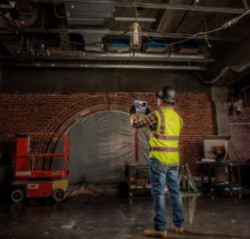As Alex Micallef, UK General Manager at Graitec explains, the take-up of digital technology must accelerate if offsite methods are to move mainstream.
While progress has been made in recent years, driven largely by the swathe of emerging and existing issues exerting pressure on output - including the COVID-19 pandemic, skills and materials shortages and looming net zero carbon targets - the pace must quicken if Modern Methods of Construction (MMC) are to become mainstream.
MMC is playing a growing role in new buildings coming forward - not just homes, of which 20% are expected to be built using MMC by 2030, but across both commercial and residential developments, from hospitals and schools through to offices. Digital technology is central to the delivery of these new, next generation MMC schemes, from design and costing through to day-to-day delivery and development, with Building Informational Modelling (BIM) software like Revit utilised throughout the entire lifecycle of a project.
While our team has seen growth in the uptake of software within the construction industry - from developers and architects through to engineers and project managers - there remains a general lack of awareness within the industry around the benefits technology can provide (including speeding up delivery, preventing mistakes, improving accuracy and reducing margins for error) as well as capabilities of new and emerging digital platforms and software. We spend a lot of time working with teams to embed new technology and educate on its scope and the capabilities it brings to the table.
Improving performance As a construction software expert, our goal is to help digitise construction, manufacturing and fabrication, streamlining processes and improving performance. The conversations we are having demonstrate that the appetite is there to deliver genuine digital transformation - along with the understanding that it is no longer a choice, but an inevitability. To put things into perspective, a recent report from GlobalData revealed that 36% of companies lack the financial budget for technological innovation, while 28% blame a lack of awareness of new technology. In addition, 34% feel that they lack sufficiently skilled labour to adopt technology. There remains a great deal of work to be done in encouraging the industry to not only adopt new digital technology,
but to ensure that software is being optimised and used to the best effect. Digital technology is a welcome new addition to the Construction Playbook The government recently included digital technology as a key component of its updated Construction Playbook while continuing to spearhead the adoption of MMC.
The drive for MMC in government projects was reiterated in the latest Playbook, backed up with the introduction of new targets for the adoption of new building techniques alongside a presumption in favour of offsite construction. It's positive to see the inclusion of digital technology within the guidelines, with the government continuing to lead from the front - particularly in highlighting the importance of 'data interoperability', ensuring that project partners can work more collaboratively and effectively with each other.
Ending the reliance on outdated tools Unfortunately, there are still many businesses working from excel spreadsheets - either unaware of the capabilities that digital technology offers or due to a reluctance make the shift to new processes and workflow management. Yet much of the software that would make a real difference to big picture challenges is very simple to install and adopt - such as cloud production applications, for example.
Cloud technology helps to improve productivity and streamline interaction between project teams, helping to prevent errors and ultimately accelerating the delivery of development. It's a simple piece of kit that delivers enormous benefit. Similarly, BIM tools are an essential component of any new scheme coming forward, yet the technology is still, in many cases, not being used properly or to best effect. Through this lens, it is easy to see why more advanced tools, such as automation, robotics and mobility, are still not properly understood.
Adoption of digital technology must be a key focus for 2023 The adoption of digital technology is an essential component of the wider shift to MMC in the UK - both MMC and technology are key to tackling the many challenges facing the construction industry, from the ongoing skills shortage and reducing carbon output as well as business critical short-term challenges such as the impact of inflation on margins, the subsequent value engineering in the design and delivery of projects and ensuring that new schemes remain viable.
Moving into 2023, leaders must champion the adoption of technology in construction, forming teams with the skills and knowledge to ensure that software is being operated efficiently and to its maximum potential. Embedding technology throughout the construction process will encourage new innovation, expand development capabilities and move the MMC agenda forward in a more meaningful way.
Read the full article, go to Offsite Magazine









